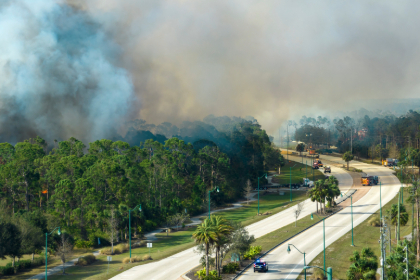Blog
Are you buying property in wildfire zones? Advanced Title Company in Grand Junction, CO, helps you navigate the risks, protect your investment, and close confidently.

A clear title is only the beginning. In wildfire zones, you need coverage that goes the distance. Trust Contact Advanced Title Company in Grand Junction, CO, to guide you—call (970) 255-7677 now.
Buying property in Colorado is a dream for many—mountain views, fresh air, and wide-open spaces. But for buyers in Grand Junction and other areas of Western Colorado, that dream comes with a seasonal risk: wildfire. As the state grapples with record-high temperatures and drier-than-average summers, it’s essential to understand the implications of buying property in wildfire zones and how title insurance fits into that equation.
In this blog post, we’ll explore what wildfire zones mean for homebuyers, how they influence title and ownership rights, and why title insurance should be a critical part of your property protection plan, especially during fire season.
What Are Colorado’s Wildfire Zones?
Colorado designates wildfire-prone areas as Wildland-Urban Interface (WUI) zones. These are regions where homes and businesses are built near or within flammable wildland vegetation, such as forests or grasslands. Grand Junction, situated at the edge of Colorado’s western slope, is no stranger to this classification. Parts of Mesa County are already designated WUI zones, and the state continues to expand these maps based on evolving fire risk data.
If you’re buying property in wildfire zones, you’re investing in areas with increased exposure to:
- Seasonal wildfire threats
- Smoke and air quality issues
- Evacuation orders
- Insurance restrictions
- Complex property access and easement rights
In short, wildfire zones affect much more than just the potential for fire—they impact infrastructure, safety, resale value, and title legitimacy.
Colorado summers bring sunshine and serious fire risks. Before you buy, get the facts and the title protection you need. Call Advanced Title Company in Grand Junction, CO, at (970) 255-7677 today to get started on your title journey.
Why Wildfire Risk Should Concern Buyers in Grand Junction
Over the past decade, wildfires in Colorado have grown in frequency, size, and severity. Grand Junction may seem less vulnerable than mountain towns like Glenwood Springs or Estes Park, but Mesa County still reports several fire incidents each summer.
Buyers should be concerned because:
- Damage isn’t Always Immediate: Even if a property hasn’t been touched by fire, smoke, erosion, or debris flows can cause lasting damage.
- Hidden Title Issues: Fire-damaged land may have unclear boundaries, destroyed landmarks, and missing public records.
- Access Rights May Shift: Roads destroyed by fire or altered by recovery efforts can affect legal access to a property.
- Property Lines Get Blurred: After a wildfire, fences, markers, and structures may disappear, leading to disputes.
If you’re buying property in a wildfire zone, a thorough understanding of these risks is critical to avoiding surprises—and potential legal battles—down the line.
How Wildfire Zones Impact Title Insurance
Title insurance protects buyers and lenders against defects or disputes over property ownership that may arise after the sale. Due to the unique and elevated risks, title insurance becomes even more essential when buying property in wildfire zones.
Here's how wildfire zones can influence title concerns:
- Destroyed Documentation
Fires can destroy original property records, surveys, or easement documents stored on-site or in county buildings. Without these records, title searches become more complicated. - Encroachment and Boundary Disputes
A fire may destroy visual landmarks like fences, tree lines, or structures that delineate boundaries, increasing the chances of future disputes. - Unrecorded Access or Utility Easements
In rural areas, shared driveways or utility lines may not be formally recorded. Fires that alter the landscape or lead to rerouting may bring these hidden issues to light. - Rebuilding Rights and Zoning Conflicts
Title insurance can help ensure you understand what you legally can and cannot rebuild on the property, especially in environmentally protected areas or high-risk fire zones.
Essential Questions to Ask When Buying Property in Wildfire Zones
Before you close on a property in or near Grand Junction this summer, make sure to ask the following:
- Is the property located in a designated wildfire zone (WUI)?
- Are there any easements or access roads that might be impacted by fire damage?
- Is there a history of wildfires on or near the land?
- Is the home insurable with a standard policy, or will you need specialized wildfire coverage?
- Are all boundaries clearly marked and supported by updated surveys or title documents?
- Has the property undergone mitigation (clearing brush, installing fire-resistant features)?
Knowing these answers empowers you to make a better-informed purchase and lean on your title insurance provider to investigate any red flags.


